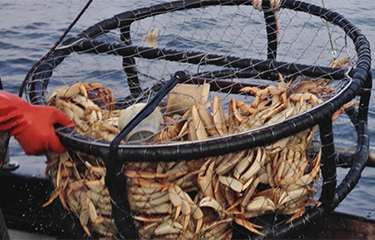The commercial Dungeness crab fishery in the U.S. state of California has been delayed a second time over the potential for humpback whale entanglements in gear, and poor meat quality in the northern fishing zones 1 and 2, the California Department of Fish and Wildlife announced 17 November.
The northern zones had been scheduled to open 1 December, but testing turned up poor crab meat quality test results for Mendocino, Humboldt, and Del Norte counties. The commercial fishery in zones 1 and 2 will be delayed until at least 12:01 a.m. on Saturday, 16 December pending another round of meat quality testing, the agency said.
Meanwhile the commercial fishery in zones 3, 4, 5, and 6 remains delayed, “due to the presence of high numbers of humpback whales and the potential for entanglement with lines and traps in this fishery,” according to the department. Whale sightings and a reported entanglement 11 November have already delayed the season, a recurring situation in recent years.
CDFW Director Charlton H. Bonham will receive the next risk assessment around 7 December and reevaluate temporary recreational crab trap restrictions and the commercial fishery delay.
The Dungeness season in the U.S. state of Oregon, which was supposed to open 1 December, was also delayed until at least 16 December due to low meat yield. The Oregon Department of Fish and Wildlife announced 17 November the next round of crab meat yield and biotoxin testing will occur “in the coming weeks” at Oregon’s six major crabbing ports in partnership with the Oregon Dungeness Crab Commission, Oregon Department of Agriculture, and the commercial Dungeness crab industry, and that pending those results, the season may be further delayed or split into areas with different opening dates.
Commercial Dungeness crabbing in the U.S. state of Washington has also been delayed through at least 1 December.
Following the announcement, environmental non-governmental organization Oceana renewed its call for further experiments with on-demand, or “pop-up” gear in spring 2024 that potentially could reduce buoys and vertical lines in the fishery.
Oceanas California Campaign Director and Senior Scientist Geoff Shester, a member of the California Dungeness Crab Fishing Gear Working Group, said forecasters expect to see “strong El Niño conditions in the coming months, which are likely to drive humpback whales closer to shore as they follow available prey — like anchovy — into shallower waters.”
“With predictions that a strong El Niño event could persist through the spring, we are likely to see the crabbing season come to an early close, compressing an already shortened season with the statewide delay,” Shester said. “Innovative pop-up fishing gear will be available for testing under experimental fishing permits this spring, and once authorized, could be a way to extend the fishing season into spring months, providing additional fishing opportunities in a way that is also safe for whales.”
Last year’s commercial Dungeness crab season on the U.S. West Coast also began late after delays repeated delays, and fishermen endured low prices once it began.
Alaska’s 2023 season ended with 87 metric tons (MT) of Dungeness crab caught worth USD 485,000 (EUR 444,000). California fishermen caught 9,592 MT of Dungeness crab worth USD 55 million (EUR 50.3 million). Crabbers in Oregon caught 14,357 MT of Dungeness worth USD 85.2 million (EUR 78 million). And Washington crabbers caught 11,947 MT of Dungeness valued at USD 76 million (EUR 69.6 million), according to the Pacific Fisheries Information Network.
Photo courtesy of California Department of Fish and Wildlife







